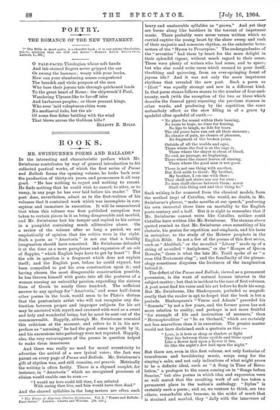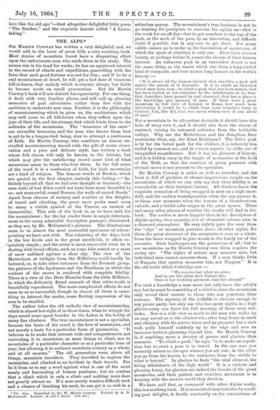BOOKS.
MR. SWINBURNE'S POEMS AND BALLADS.* IN the interesting and characteristic preface which Mr. Swinburne contributes by way of general introduction to his collected poetical works, of which the first series of Poems and Ballads forms the opening volume, he looks back over the production of thirty-six years, and pronounces it all very good. "He has nothing to regret and nothing to recant.
He finds nothing that he could wish to cancel, to alter, or to unsay, in any page be has ever laid before his reader." The poet does, nevertheless, admit as to the first-written of his volumes that it contained work which was incomplete in con- ception and immature in execution. It will be remembered that when this volume was first published exception was taken to certain pieces in it as being disagreeable and morbid, and Mr. Swinburne lost his temper and replied to his critics in a pamphlet containing much alliterative abuse. On a review of the volume after so long a period, we are emphatically of opinion that the critics were in the right. Such a poem as " Anactoria " is not one that a healthy imagination should have conceived. Mr. Swinburne defended it at the time as a mere paraphrase and expansion of an ode of Sappho, "which English boys have to get by heart" ! But the ode in question is a fragment which does not explain itself; and the English poet, before he could expand, has been compelled to put his own construction upon it ; and having chosen the most disagreeable construction possible, he has thrown himself with gusto into all the postures of a woman nursing an unhealthy passion, expanding the sixteen lines of Greek to nearly three hundred. The sufficient answer to any apology for " Anaetoria," and some half-dozen other poems in the book, would seem to be Plato's dictum that the pantomimic artist who will not recognise any dis- tinction between proper and improper subjects for his art may be anointed with myrrh and crowned with wool as a sweet and holy and wonderful being, but be must be sent out of the commonwealth. Happily, although Mr. Swinburne resented this criticism at the moment, and refers to it in his new preface as "amusing," he had the good sense to profit by it, and his excursions into pathology were not repeated. Happily, also, the very extravagance of the poems in question helped to make them innocuous.
And there was really no need for moral eccentricity to advertise the arrival of a new lyrical voice; the fact was patent on every page of Poems and Ballads. Mr. Swinbume's gift of rhythm was, and still remains, sui generis. Metrically the writing is often faulty. There is a rhymed couplet, for instance, in " Anactoria " which no recognised processes of elision would enable one to scan :- "I would my love could kill thee, I am satiated With seeing thee live, and fain would have thee dead." And the slurred syllables in the long metres are often such
• The Poems of Algernon Charles Ste-inhume. Vol. I. "Poems and Ballad,: First Series." London : Cluttto and Windus. Os. net.j
heavy and unslurmble syllables as "grown." And yet they are borne along like boulders in the torrent of impetuous music. There probably were never verses written which so carried captive the young heart by the sheer sweep and rush of their majestic and sonorous rhythm, as the catalectic hexa- meters of the "Hymn to Proserpine." The undergraduates of the " seventies " had them by heart for the mere delight in their splendid vigour, without much regard to their sense. There were plenty of writers who had sense, and to spare ; but who else could write verse which seemed to pour itself, throbbing and quivering, from an ever-springing fount of joyous life ? And it was not only the more impetuous rhythms that revealed the new poet. Such a poem as " Ilicet " was equally strange and new in a different kind. In that poem stanza follows stanza to the number of four-and- twenty, each (with the exception of the two or three which describe the funeral pyre) repeating the previous stanzas in other words, and producing by the repetition the same melancholy effect as the slow filling in of a grave bj.
spadeful after spadeful of earth:—
" No place for sound within their hearing,
No room to hope, no time for fearing,
No lips to laugh, no lids for tears. The old years have run out all their measure ;
No chance of pain, no chance of pleasure, No fragment of the broken years.
Outside of all the worlds and ages, There where the fool is as the sage is, There where the slayer is clean of blood, No end, no passage, no beginning, There where the sinner leaves off sinning, There where the good man is not good.
There is not one thing with another, But Evil saith to Good: My brother,
My brother, I am one with thee : They shall not strive nor cry for ever : No man shall choose between them: never Shall this thing end and that thing be."
Such writing is far removed from the classical models, from the method (say) of Catullus, who would, no doubt, in Mr. Swinbume's phrase, "make mouths at our speech," preferring his own immortal three lines on mortality to the English poets century and a half. But it is right to remember that if Mr. Swinburne cannot write like Catullus, neither could Catullus have written like Mr. Swinburne. The stanzas above quoted remind us that Mr. Swinburne owes something of his rhetoric, his genius for repetition and emphasis, and his taste in metaphor, to the study of the Hebrew prophets in the English Bible. In not a few of the poems of this first series, such as " Aholibah," or the so-called "Litany" made up of a string of so-called " Antiphones," or the "Masque of Queen Bersabe," there is what the late Mr. Traill spoke of as "a rum Old Testament ring" ; and the familiarity of the phrase- ology sometimes disguises the freshness of the imagination behind it.
The defect of the Poems and Ballads, viewed as a permanent possession, is the want of natural human interest in the subject-matter ; but that is incident to the race of first volumes. A poet must find his voice and his art before be finds his song. But Mr. Swinburne, like Shakespeare, preluded so magnifi- cently that the reader is apt to forget that the book is but a prelude. Shakespeare's "Venus and Adonis" preceded his "Sonnets" by not a few years, and the former poem has not more relation to reality, and perhaps is not more fruitful "for example of life and instruction of manners," than " Hermaphroditus " or "In an Orchard," which are certainly not less marvellous than it in execution. The greater master would not have disdained such a quatrain as this :—
"Love, is it love or sleep or shadow or light That lies between thine eyelids and thine eyes? Like a flower laid upon a flower it lies, Or like the night's dew laid upon the night."
But there are, even in this first volume, not only fantasias of tumultuous and bewildering music, songs sung for the singing's sake, and not only indications of what might prove to be a definite ideal, such as "A Song in Time of Revo- lution," a prologue to the omen coming on in "Songs before Sunrise," but also poems in which idea and expression were so well mated that the resulting work of art has taken a permanent place in the nation's anthology. " Itylus" is certainly such a poem ; and so, we venture to think, are two others, remarkable also because, in the midst of much that is strained and morbid, they "daily with the innocence of love like the old age,"—that altogether delightful little poem "The Sundew," and the exquisite lament called "A. Leave- taking."



































 Previous page
Previous page